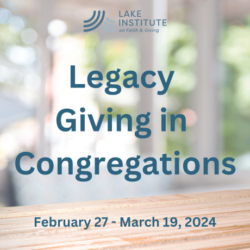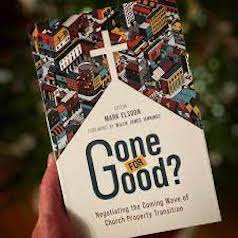Tried and True
Tried and True
by Lake Institute Staff
Every new year brings a list of new trends – the things you must do in 2024 to make this the best year ever! It is inevitable that things change, and we must often adapt to keep up with the world around us. However, as people of faith, we know that there are some tried-and-true practices that remain relevant and timeless. The work of loving our neighbors, the practice of prayer – these don’t need a hip, new remix. So, in today’s issue of Insights, we’re reminding you of things you already know as you go into 2024. Look at that – you’re already ahead for the year!
Focus on the Mission
It’s hard to successfully invite people to make new gifts when the mission isn’t clear. Your organizational mission captures the essence of why your organization exists and what you aim to do. Who are you, as an organization? What do you do? Whom do you serve? What is your impact? Can you clearly articulate an answer to all of these questions? If so, great! Keep up the good work!
If not, now is the time to sit with these questions and figure out who you are as an organization. Ignore the “new year, new you” slogans. Instead, bring together a few of your leaders to clarify your mission and find opportunities to regularly highlight your mission in different parts of your organization throughout the year.
Tell Your Story
Just because you’re clear about your organizational mission doesn’t mean that others are too. It’s important to tell stories that show your mission in action. When others read about moments of impact or hear how lives are improved as a result of your work, they are more likely to find ways to engage in your mission and support your work.
Telling your story doesn’t require a full marketing team. Most of us have quality recording devices in our pockets. The next time you host an event, pull a volunteer aside and ask to record them sharing why this mission is important to them. Pay attention to those who are always taking photos – ask them to capture moments that help highlight the importance of your work. There are people in your organization with gifts that can support your storytelling efforts – bring them into this work with you!
Build Relationships
Relationships are key to everything we do in our religious organizations and congregations. On a regular basis, we hear from religious leaders who don’t want fundraising to “get in the way of relationships” – but, in fact, inviting gifts is all about relationships.
Use your good storytelling skills to keep building stronger relationships with your constituents. Invite givers, volunteers, and/or newcomers to join you for lunch or coffee and take the opportunity to learn more about their interest in your organization. What matters to them about what you do? How did they first get involved? The idea isn’t to ‘make a pitch’ or twist their arm into doing or giving more – it’s to listen and learn and build new connections. You might also discover that there are core pieces of the organizational mission or key stories you think everyone knows that could refresh your communications strategy!
Say Thank You
In congregations, it may be assumed that everyone knows they are expected to give. In organizations, there may be an assumption that volunteers and board members will automatically also be donors. Though our spiritual texts or organizing documents may spell out some of those expectations, everyone still has a choice. Donors and members are acting on that choice when they make a gift, and yet too often we don’t say thank you. Taking people for granted is bad for relationships, and it’s bad for giving! The new year is a great opportunity to cultivate the habit of writing some personal thank you notes (or texts) every week to the people giving their time and money. These aren’t fundraising solicitations – they’re expressions of gratitude for who people are and what their involvement means in your organization.
Tried and True
Focusing on the mission, telling your story, building relationships, and saying thank you – these are just a few practices that aren’t new to you. It’s not likely you’ll need to reinvent the wheel when putting them into practice – though you may need to renew a practice or two that got lost in the shuffle of your day-to-day work. Sure, it’s possible that there is a exciting new way of managing your social media, or an app that will enhance your donor’s giving experience. However, paying attention to these tried-and-true practices will benefit your organization in deeper, more meaningful ways.
As you prepare for what’s ahead in 2024, what other tried-and-true practices do you want to refresh and renew? What are we missing on this list? Discuss this in your next staff meeting, or share your thoughts on social media and tag us to join in on the conversation!
Expanded Perspective: Anti-Resolutions
 This excerpt comes from Kat Bair at Ministry Incubators. You can read the full blog post here.
This excerpt comes from Kat Bair at Ministry Incubators. You can read the full blog post here.
There is a real temptation for New Year’s resolutions to lean towards not self-improvement, but self-loathing. In the posts of people saying that this year they are going to be fitter, more organized, better with money, they’re going eat better, work better, be better, there is an undeniable tone of people looking at themselves and thinking they can just will themselves into being closer to some ideal self they imagine.
Implied in that belief is the one that the reason that they are at their current health status, financial status, spiritual health because they just haven’t tried hard enough.
As though all of us don’t walk around doing the best we can every single day.
I wonder if we could reframe the idea of New Year’s resolutions to be about celebrating all that we already are, and continuing to move towards the things we want, instead of just focusing on where we believe we are falling short.
When the ancient Israelites gathered, they routinely spent time going over the ways that God had been with them, the good things that happened, the places where they had thrived, grown, and seen the goodness of God.
I wonder if before we write any resolutions, we should start by looking over our past year for the things that are worth celebrating. Where has God been faithful? What good things have emerged? Where have we been in line with what the Spirit calls us to? What can we be proud of? What have we done in our work, our family, ourselves that is worthy of a little toast? (continue reading)
Legacy Giving in Congregations
 We are pleased to share that we have a new online, short course coming in late February. Developing Legacy Giving in Congregations will help course participants develop the understanding and practical skills to launch or enhance a legacy giving program for their congregation. The class will meet 90 minutes once a week beginning February 27 and concluding March 19. There is a discount for ECRF alumni! Learn more and register today.
We are pleased to share that we have a new online, short course coming in late February. Developing Legacy Giving in Congregations will help course participants develop the understanding and practical skills to launch or enhance a legacy giving program for their congregation. The class will meet 90 minutes once a week beginning February 27 and concluding March 19. There is a discount for ECRF alumni! Learn more and register today.
Gone for Good?
 As tens of thousands, and billions of dollars, of church-owned property is sold or repurposed throughout the United States in the next decade, will those properties be gone for good?
As tens of thousands, and billions of dollars, of church-owned property is sold or repurposed throughout the United States in the next decade, will those properties be gone for good?
Edited by Mark Elsdon with a foreword by Willie James Jennings, Gone for Good? Negotiating the Coming Wave of Church Property Transition, draws upon the experience and expertise of a diverse and interdisciplinary group of contributors, including Lake team member Elizabeth Lynn. Together, they highlight powerfully what we are losing as church property usage changes at an unprecedented speed and scale, and they help us imagine the innovative possibilities that can emerge.
Subscribe
Insights is a bi-weekly e-newsletter for the religious community and fundraisers of faith-based organizations that provides:
- Reflections on important developments in the field of faith and giving
- Recommended books, studies and articles
- Upcoming Lake Institute events

